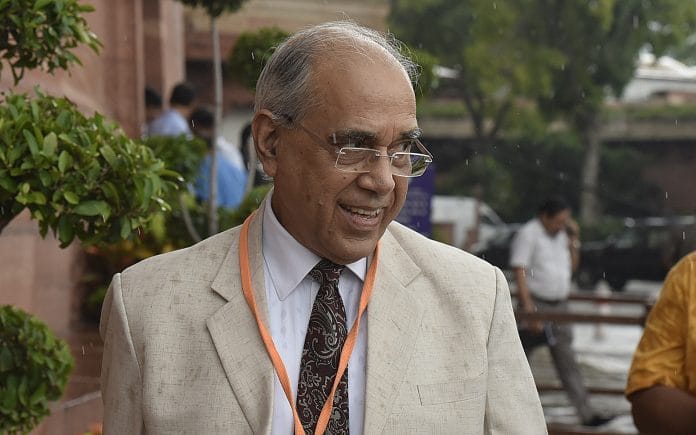Nripendra Misra was TRAI chairman during Raja’s tenure as telecom minister. But court stated his deposition was not supported by witnesses or official documents.
New Delhi: The ruling acquitting former telecom minister A. Raja and other accused in the 2G spectrum allocation case has brought the deposition of senior bureaucrat Nripendra Misra under sharp focus.
Misra is currently Principal Secretary to Prime Minister Narendra Modi, and at the time, was chairman of the Telecom Regulatory Authority of India (TRAI) and also ex-telecom secretary. His deposition is the one the CBI relied on most to build its case, but the court found it unconvincing.
While the court praised Misra for his due diligence, it stated that his views were not supported by other witnesses or official documents. Misra was mentioned 44 times in the ruling.
Misra’s stand on key issues, such as increasing entry fee for licences, auctioning spectrum and granting prior clearances, did not find favour with the court. In his deposition, Misra said he had recommended deciding spectrum prices through a “market mechanism”, while Raja argued against increasing entry fee for licences or auctioning of the spectrum.
“Even if the version of Sh. Nripendra Misra is accepted, that revision of entry fee was recommended, there is no material on record that anyone understood these recommendations in this manner,” the judge, O.P. Saini, noted.
The court further said that the 2007 TRAI recommendations on redetermination of the entry fee were also read out of context to argue that these recommendations were based on the unprecedented growth of the telecom sector.
“However, if the entire paragraph is read in context, it is clear that as far as initial spectrum for 2G is concerned, it did not recommend any change. I could not lay my hand on any deposition by any witness who deposed that TRAI recommended revision of entry fee for 2G spectrum. Not a single witness supported this view, except Sh. Nripendra Misra. However, his view is not supported by the contents of the recommendations,” the judgment stated.
The CBI is planning to build its appeal against the verdict around Misra’s testimony. “Should the court give its own context to recommendations, even after the chairperson who wrote those recommendations has explained what it meant?” asked a CBI legal officer who refused to be identified. “The court’s disregard for Misra’s testimony will be strongly contested in high court.”
Tussle between successive telecom secys
Two former secretaries of the Department of Telecommunications, Misra and his immediate successor D.S. Mathur, testified that Raja ignored several of his own bureaucrats and those from other departments in taking his decisions. However, Misra and Mathur disagreed on many other aspects.
Mathur claimed he raised all issues flagged by the TRAI in a separate, independent note, which was not part of court records. But the court said he and Misra were never on the same page in understanding TRAI regulations.
Puzzlingly, while the judge held that no TRAI recommendations were made that Raja disregarded, and said there was no proof that no other bureaucrat understood it that way, except for Misra, he lauded him for ensuring implementation of those recommendations.
“He also requested Sh. D.S. Mathur to bring the far-reaching impact of the recommendations to the notice of Hon’ble Minister for Communications & IT. This time also, Sh. D.S. Mathur did not bother to reply. This shows how much pain Sh. Nripendra Misra was taking to ensure due implementation of TRAI recommendations,” the judge stated.
The court, in fact, placed the blame squarely on Mathur for his “irresponsible and callous attitude”. The court recorded that Mathur did not respond to as many as seven communications by Misra, then-TRAI chairman, between October and December 2007.
The judge also blamed Mathur for not responding to a letter written in 2007 by Rajya Sabha MP Rajeev Chandrasekhar, relating to multistage bidding process. The MP later wrote to then-Prime Minister Manmohan Singh, alleging irregularities by Raja. The court further said Mathur was “largely responsible for the mess in the DoT”.
“He was perhaps awaiting his impending retirement on 31.12.2007. He could have awaited his retirement in a more graceful manner,” the judge concluded.







Shri Nripendra Misra, a civil servant of great integrity, also wanted a three year lock in period for the licences, to prevent the instant gratification resorted to by Swan and Unitech. The trial court judgment will not fare well in appeal. The Congress would be well advised not to take ownership of it so uncritically.